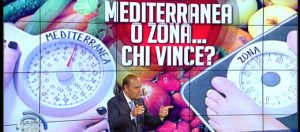Door to door, the food fact criticizes him
 In the last episodes of the famous show ” Porta a Porta ” conducted by Bruno Vespa that were dedicated to nutrition and diet, the Mediterranean diet was put at the center of a challenge with diets more or less valid from a scientific point of view: if in the past it happened with the chronodieta, the Mediterranean Zone diet, the protein diet, the vegan and vegetarian diet, one of the last episodes before the summer closure of the program saw the heated debate on the Mediterranean diet, the Tisanoreica diet and the Mediterranean Zone diet. For the uninitiated, Gianluca Mech’s Tisanoireica diet is the one that uses substitute meals, herbal teas and supplements for weight loss, the Mediterranean Zone is the new variant of the Zone diet proposed by Dr. Berry Sears (no carbohydrates such as bread and pasta, yes to fruit, vegetables, olive oil).
In the last episodes of the famous show ” Porta a Porta ” conducted by Bruno Vespa that were dedicated to nutrition and diet, the Mediterranean diet was put at the center of a challenge with diets more or less valid from a scientific point of view: if in the past it happened with the chronodieta, the Mediterranean Zone diet, the protein diet, the vegan and vegetarian diet, one of the last episodes before the summer closure of the program saw the heated debate on the Mediterranean diet, the Tisanoreica diet and the Mediterranean Zone diet. For the uninitiated, Gianluca Mech’s Tisanoireica diet is the one that uses substitute meals, herbal teas and supplements for weight loss, the Mediterranean Zone is the new variant of the Zone diet proposed by Dr. Berry Sears (no carbohydrates such as bread and pasta, yes to fruit, vegetables, olive oil).
But Il Fatto Alimentare does not fit in, and publishes an article in which he talks about the danger of diets becoming spectacular, about the lack of authoritative figures who know how to deal with medical and scientific topics in an appropriate way from the point of view of management (Bruno Vespa is less adequate, we read, by Piero Angela) and the inconclusiveness of the challenge between diets compared to the message of the fight against obesity, which should be treated from a medical and scientific point of view also on television. Obviously it is difficult not to agree with the article of the Food Fact,but logically, if only doctors and in particular dieticians or competent people should talk about diets and nutrition (but, without detracting from the highly respectable Piero Angela, with what criterion to establish which conductor or other figure who exposes facts related to nutrition and dieticians is competent? Degree? Scientific journalism?), there would not be :
– 99% of the sites that online talk about diets and nutrition and that are not directed by doctors (including this one)
– 90% of apps
– 90 % of magazines that talk about diets and nutrition and articles in magazines
– 99.9% of the articles you find on the net, and which are not written by doctors and dieticians (all those that are mentioned in a nebulous way and not proven by names and attested to a committee, a group of doctors, a expert group)
– 70% of the diet books you find on the market.
It should also be excluded that the underpaid intern writes on websites and newspapers, but that the articles are all signed by doctors or scientific journalists. In the past I myself have written articles for dieticians and doctors who did not even check the texts before publication: five years had passed when they asked me to become a freelance journalist simply to be better accredited.
Not to mention the thorny chapter for which in Italy diets can be prescribed by everyone, when the law limits them to dieticians: instead we have the company that prescribes diets and supplements, the coach who prescribes a diet, the nutritionist, the naturopath, the pharmacist, the biologist, the television entertainer. Isn’t this serious and much more serious than a TV episode?
So yes, Il Fatto Alimentare is right , but either this reasoning applies to the whole world of information and to all forms of disclosure, or it would be better to limit ourselves to talking about “bad taste”. What do you think?





























+ There are no comments
Add yours